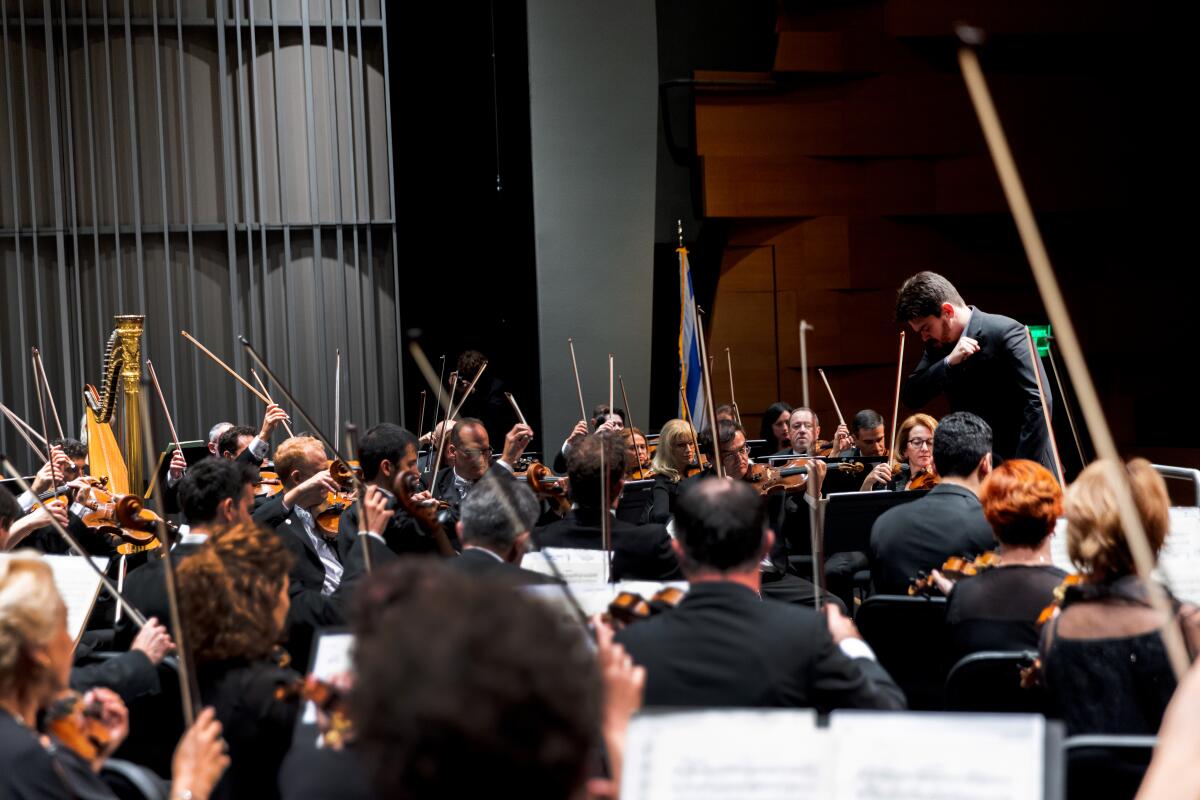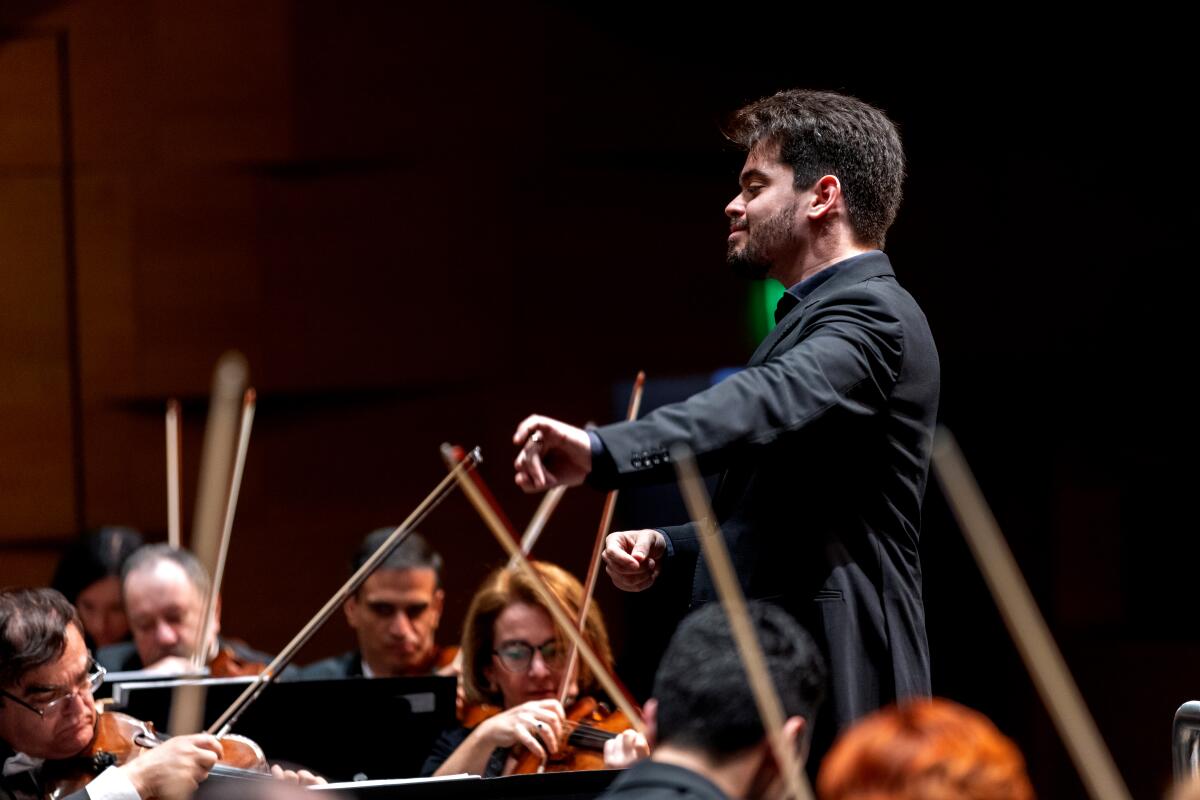Review: The Israel Philharmonic was led by the same conductor for 40-plus years. His successor shines in L.A. debut

The Israel Philharmonic, founded the day after Christmas in 1936 as the Palestine Symphony and first conducted by Arturo Toscanini, cannot escape history. Becoming a symbol of the new nation after World War II as the Israel Philharmonic Orchestra, it cannot escape politics either, however much it may try.
Controversy follows the Israelis. Because of various boycott Israel movements, the orchestra has seen protests and concert disruptions on foreign tours.
Saturday night the Israel Philharmonic (it has now dropped Orchestra from its name) performed for the first time at the Soraya, as part of the orchestra’s first overseas tour since the pandemic. It found itself in what might have seemed a volatile situation. The San Fernando Valley is home to L.A.’s largest Jewish population, which has been rattled by the latest wave of antisemitism. The week of the concert, moreover, Israel elected its most overtly anti-Arab government in the nation’s history.
Even so, there were no protesters Saturday. Nor were there metal detectors or other visible security devices (although behind the scenes was evidently different, including the orchestra not allowing, for security reasons, press photographers). The theater was full. The concert went as planned and was exceptional.
Zubin Mehta, who has had a more-than-half-century relationship with the Israel Philharmonic, stepped down as music director in 2019 (he is now emeritus). This is the orchestra’s first tour with its young and electrifying new music director and a former Mehta protégé, Lahav Shani, and that is news.
Shani’s program — the first symphonies of Mahler and Paul Ben-Haim — was news as well. Though devised months ago, it subtly responded, with a somber nuance and sad grace, to these latest issues facing both Israel and international antisemitism, ever more a reminder of an orchestra tied to history.
Both Mahler and Ben-Haim, who was the father of Israeli classical music and who followed closely in Mahler’s footsteps, envisioned a world of cultural unification. Mahler’s First began the composer’s mission of making the symphony novelistic, becoming less abstract and more capable of containing a wealth of experience, including music from folk and ethnic sources. The First, for instance, radically includes instances of the Jewish music Mahler grew up with in his native Bohemia.
Ben-Haim was born in Munich in 1897, the year after the premiere of the final version of Mahler’s First and the year Mahler, facing antisemitism, converted to Catholicism, a requirement to become music director of the Vienna State Opera. In 1920, the young Ben-Haim (then Frankenburger) became an assistant to the conductor Bruno Walter, who had been Mahler’s assistant. Ben-Haim fled Nazi Germany 13 years later and emigrated to the British Mandate of Palestine, where he assumed his Hebrew name.
In Palestine, Ben-Haim became entranced by an extraordinary Yemenite singer Bracha Zefira, who inspired him to find novel ways to incorporate many aspects of the Middle Eastern music — from Jewish and Arabic traditions — that was all around him into his fairly conventional early 20th century symphonic language. His First Symphony, the first symphony to be written in Israel, has moments that sound like riffs on Mahler but with a startling difference. While the Middle Eastern references may not stand out in it, they enrich, under the surface, harmony and melody. The surface, though, is rage and anxious supplication. This was a wartime symphony, completed in 1940 just as the Nazis invaded France and premiered by the composer with the Palestine Symphony.
Mahler had a bent for tragedy, and Ben-Haim’s symphony reveals the worst of what Mahler foretold. It also marshals Mahler’s compensatory loving embrace of life. As for Ben-Haim being less sentimental than Mahler, he had to be to produce a score of profound resilience.
In the end, though, what cultural influence Ben-Haim, who was a critical force in creating a school of Israeli music, may have exerted in Israel has largely disappeared since his death in 1984. He culturally grounded a country of immigrants with their mainly European traditions and with their environment. But Israel has always been a contradiction of cultural conservatism and sweeping modernization, and Ben-Haim wrote in a, if not dead, dying musical language of another time and place. Still, a new generation of Israeli musicians, such as Shani and conductor Omer Meir Wellber, have initiated a revelatory Ben-Haim revival.

Saturday’s performance of the 1941 symphony, which began the concert, proved a shattering reminder of the horrors nationalist forces unleashed in the past. Shani, who is 33 and is also music director of the Rotterdam Symphony, conducted without a baton. With open hands, he was expansive in nurturing radiant melody, the orchestra his flock. With fists clenched, he could be viscerally pugilistic.
The latter is how the symphony begins — with a punch to the gut. The orchestra chose to play on a flat stage at the Soraya (they use risers in their hall in Tel Aviv) which created a tightly amalgamated sound. This became like a single instrument of unstoppable force, not a collection of individuals.
Displaying the frighteningly fast reflexes of, say, a great fencer, Shani exalted in a kind of virtuosic suddenness. He makes music of the moment and of the nano-second, and the shock coefficient is often high. He must be terrifying to play under. But the immediacy is thrilling.
More of the details in Ben-Haim’s symphony can be heard in the new Deutsche Grammophon recording of it with Shani and the Israel Philharmonic. A more refined, expansive and hopeful approach tempers a beautiful recording that Wellber made of the score with the BBC Philharmonic in 2019. Both are necessary. But given our current era of uncertainty, what Shani presented came across with uncanny urgency as an act of resistance, a call for action.
The Mahler symphony that followed did reveal lively details galore, no matter the lack of risers. Shani sought drama out of every instance. Individual musicians seemed in their solos like characters in a complex narrative. But blunt, brutal climaxes had but one function: to make your knees shake. Oddly enough, the klezmer-like passages were understated. Triumph at the end, however, was how victory should sound.
Mehta is not an easy act to follow, yet Shani is clearly the right guy — tough and terrific — at the right time and place for this famously ungovernable orchestra. He has the potential to be an inspiration not only for the messiness of Israeli society but for the messy rest of us as well.
More to Read
The biggest entertainment stories
Get our big stories about Hollywood, film, television, music, arts, culture and more right in your inbox as soon as they publish.
You may occasionally receive promotional content from the Los Angeles Times.











